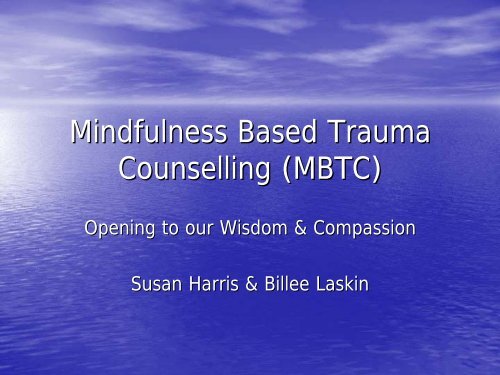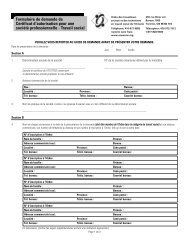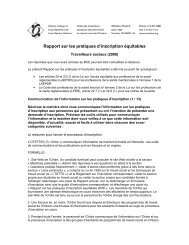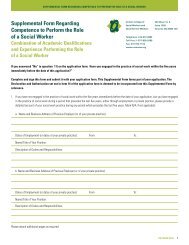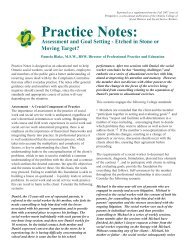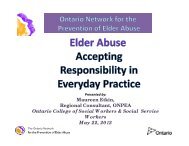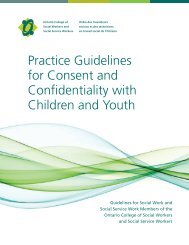Billee Laskin, RSW and Susan Harris, RSW
Billee Laskin, RSW and Susan Harris, RSW
Billee Laskin, RSW and Susan Harris, RSW
Create successful ePaper yourself
Turn your PDF publications into a flip-book with our unique Google optimized e-Paper software.
Mindfulness Based Trauma<br />
Counselling (MBTC)<br />
Opening to our Wisdom & Compassion<br />
<strong>Susan</strong> <strong>Harris</strong> & <strong>Billee</strong> <strong>Laskin</strong>
What is MBTC<br />
• MBTC is a group program that synthesizes<br />
mindfulness meditation <strong>and</strong> trauma informed<br />
counselling<br />
• This approach is based on a systemic<br />
underst<strong>and</strong>ing of the dynamics <strong>and</strong> impacts of<br />
abuse <strong>and</strong> trauma which includes the multitude<br />
of factors shaping the experience: gender,<br />
class, race, culture, ability <strong>and</strong> other social<br />
experiences<br />
• MBTC facilitation requires a regular mindfulness<br />
practice <strong>and</strong> well-developed group facilitation<br />
skills.
What is Mindfulness<br />
• Mindfulness is moment to moment awareness, a<br />
practice that invites you simply to notice what is<br />
passing through your awareness.<br />
• It is a particular way of paying attention.<br />
Mindfulness is the process of observing body,<br />
heart <strong>and</strong> mind intentionally, of letting your<br />
experiences unfold from moment to moment<br />
<strong>and</strong> accepting them as they are. (Kabat Zinn)<br />
• Mindfulness does not involve rejecting thoughts,<br />
feelings, sensations, nor trying to suppress or<br />
control them. Mindfulness involves being with<br />
what is in the present moment with<br />
compassionate acceptance.
Two Wings of a Bird<br />
• Mindfulness is both a practice of awareness <strong>and</strong><br />
a practice of compassion, acceptance <strong>and</strong> non-<br />
judgment.<br />
• On this path wisdom <strong>and</strong> compassion work<br />
together: seeing things as they are happens<br />
through the lens of compassionate acceptance.<br />
• Wisdom <strong>and</strong> compassion are described as the<br />
two wings of the practice: without either one of<br />
the wings, the bird is unable to fly.
All human beings possess the<br />
capacity for accurate reflection<br />
• We are able to be aware of our experiences as<br />
we go about our lives. This capacity requires us<br />
to wake up, to be in contact with what is<br />
happening as it happens.<br />
• Waking up can transform us as we become<br />
aware of habitual patterns, judgments <strong>and</strong><br />
expectations.<br />
• Waking up can also be scary as we must face<br />
what is painful as well. It takes courage to<br />
welcome what ever arises in our experience.
What the mind knows as<br />
awareness the heart knows as love<br />
• To truly be aware, to stay open <strong>and</strong> present to<br />
our experience, necessitates its acceptance from<br />
a stance of loving kindness <strong>and</strong> compassion<br />
cultivated through the practice.<br />
• As we learn to turn toward our suffering, initially<br />
this may feel worse. As our practice deepens<br />
we learn to breathe <strong>and</strong> stay present with what<br />
is difficult.<br />
• Practicing mindfulness helps us discover a<br />
deeper sense of steadiness <strong>and</strong> harmony within.<br />
Bringing open hearted acceptance to our<br />
experience promotes deep healing.
Why bring mindfulness to the<br />
experience of abuse <strong>and</strong> trauma<br />
• Trauma <strong>and</strong> abuse impact in disconnecting <strong>and</strong> disempowering<br />
ways.<br />
• Adaptations <strong>and</strong> responses women develop throughout their lives as a<br />
a consequence of chronic abuse effect all dimensions of being<br />
including: emotions, attention or consciousness, self perception,<br />
relationships, systems of meaning <strong>and</strong> somatization.<br />
• In its support of moment to moment awareness, mindfulness<br />
practice cultivates connection. Mindfulness supports<br />
compassionately witnessing <strong>and</strong> befriending whatever arises<br />
(sensations, emotions, thoughts).<br />
• Over time this strengthens the ability to be with what arises <strong>and</strong> d not<br />
get lost in the experience.<br />
• With mindfulness we begin to see the ways we identify with<br />
thoughts, feelings, stories <strong>and</strong> beliefs. This supports the loosening<br />
of the grip of these identifications that undermine us.<br />
• Through increased awareness of these internalized trauma patterns,<br />
mindfulness builds one’s s capacity for responsiveness <strong>and</strong> choice,<br />
diminishing reactivity.
MBTC involves:<br />
• Teaching wisdom <strong>and</strong> compassion practices of<br />
mindfulness<br />
• Supporting group members to be with the direct<br />
experience of what is with non-judging awareness <strong>and</strong><br />
compassionate acceptance<br />
• Applying mindfulness skills in the moment to trauma<br />
impacts that are arising<br />
• Making the links between experience arising <strong>and</strong> the<br />
trauma story<br />
• Creating new affective experience through normalizing<br />
<strong>and</strong> validating what is arising with compassionate<br />
acceptance<br />
• Supporting opening to new ways of underst<strong>and</strong>ing <strong>and</strong><br />
being with experience
Therapeutic Applications of<br />
Mindfulness<br />
• Mindfulness-Based Stress Reduction: Jon Kabat Zinn:<br />
8-10 week course applied to chronic pain <strong>and</strong> stress<br />
reactions.<br />
• Mindfulness-Based Cognitive Therapy: Zindel Segal: 8<br />
week course adapted from MBSR applied to prevention<br />
of reoccurrence of depression.<br />
• Mindfulness Based Trauma Counselling: <strong>Susan</strong> <strong>Harris</strong><br />
<strong>and</strong> <strong>Billee</strong> <strong>Laskin</strong> bring the skills <strong>and</strong> the stance of<br />
mindfulness to work with trauma survivors.<br />
• Approaches incorporating Mindfulness:<br />
- Substance Abuse: Marlatt <strong>and</strong> Gordon, <strong>and</strong> Miller <strong>and</strong><br />
Guidry use mindfulness to prevent relapse.<br />
- Dialectic Behavioral Therapy: Marsha Linehan uses<br />
mindfulness in a skills based way to help clients with a<br />
BPD diagnosis work with acceptance.
Mindfulness <strong>and</strong> the Brain<br />
• For over 10 years, Richard Davidson, a Harvard trained<br />
neuroscientist, has been studying the impacts of the<br />
practice of mindfulness on the brain using brain scanning<br />
technology.<br />
• Subjects have ranged from very experienced meditators,<br />
Buddhist monks, to Western practitioners of Kabat Zinn’s<br />
MSBR program.<br />
• Results are demonstrating:<br />
- Increased activation in the left prefrontal cortex, an<br />
area of the brain associated with positive mood<br />
- Enhanced immune system response
Mindfulness <strong>and</strong> Secure Attachment<br />
• Siegel (2007) in “The Mindful Brain”<br />
hypothesizes that mindfulness is a process of<br />
internal attunement that forms a secure self-<br />
relationship.<br />
• This internal attunement promotes neural<br />
integration in the brain impacting the same brain<br />
structures that are developed by a secure<br />
attachment with a care giver.
MBTC research findings<br />
• Participants showed significant improvements in<br />
mindfulness as well as social support <strong>and</strong> self-<br />
esteem. Participants’ depression scores also<br />
decreased significantly.<br />
• Results also found that participants had<br />
improved scores on the measures of ability to<br />
identify <strong>and</strong> communicate subjective feelings as<br />
well as the individual’s s response to distress.
In the Words of Women<br />
• "I feel very equipped/able to live with the trauma I have<br />
experienced. I feel as though I have shifted from wanting to "fix<br />
me" to a place of acceptance. The attitude, stance of acceptance, e, is<br />
accessible through mindfulness."<br />
• "It was the most therapy work I have done around childhood incest.<br />
It gave me a place to hold the unacceptable <strong>and</strong> a safety in going<br />
gently into the profound depths of pain to heal."<br />
• "More than helpful, mindfulness is teaching me how to live, what is<br />
life, what is healthy, how to go about my days one moment at a<br />
time."<br />
• "It was very helpful to look at the mind body connection as one. It<br />
helped to learn to see the areas of trauma we experienced <strong>and</strong><br />
watch the thoughts pass through rather than cling to them, to be b<br />
more accepting <strong>and</strong> compassionate to our traumatic memories <strong>and</strong><br />
not hard on ourselves."


